Frank Zappa once said, “Without deviation from the norm, progress is not possible.” This idea is key in AI music creation. It shows how new tech is changing music making. Now, artists can make songs easily and quickly with AI.
AI is breaking old music-making rules. It lets both new and experienced musicians explore new ways to create. This opens up exciting possibilities for everyone.
AI music generators have changed how we make music. They give users tools to create, change, and share music. With over 200,000 sounds from pros, tools like Loudly1 are very useful.
As AI gets better, the line between human and machine creativity gets smaller. This leads to a new era in music making.
Key Takeaways
- AI technology is revolutionizing music creation through innovative tools.
- Users can easily create original tracks using AI-generated music applications.
- Loudly’s AI platform provides a vast library of sounds developed by professionals.
- AI music generation fosters unique music experiences for different genres.
- Ethical practices in AI music generation safeguard users and create accountability.
- Understanding the features of various AI tools enhances music creation efficiency.
Introduction to AI in Music Creation
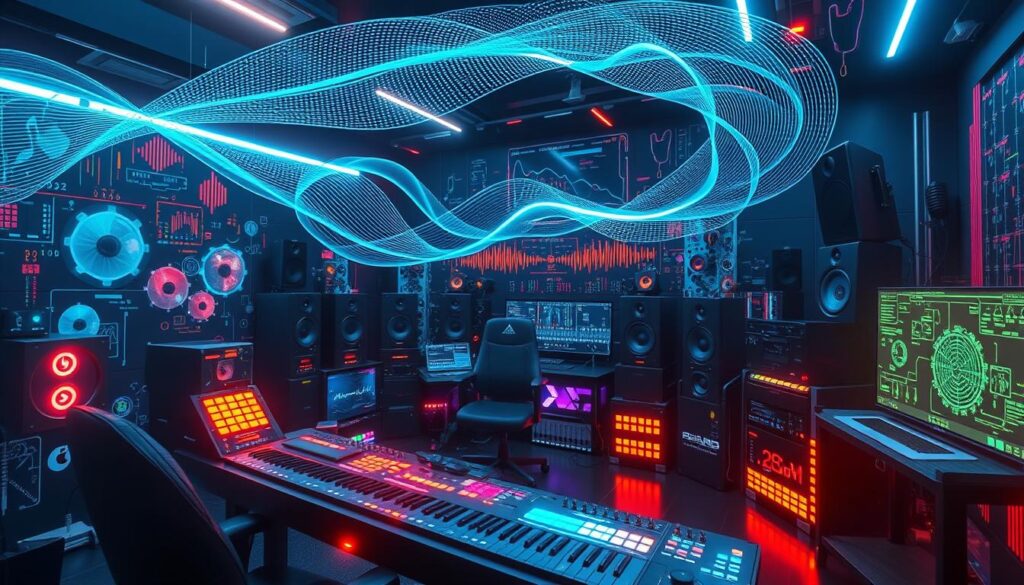
The rise of AI in music has changed music creation forever. Now, artists and new musicians use artificial intelligence music tools to make great songs easily. The global AI in music market is expected to hit USD 38.7 billion by 2033, growing fast from USD 3.9 billion in 20232.
This growth comes from new music tech that makes making music easier and faster. It shows how AI is making music production more open and efficient.
Many AI music generators today offer cool features for different tastes and needs. For example, Soundful has over 50 templates, including “LoFi” and “EDM,” to help users make tracks that match their style3. These tools can make music quickly, in seconds to minutes, and let users use their songs for free based on their subscription3.
Platforms like AIVA have made big waves, even being recognized as a composer by France’s SACEM4.
While making music fast is a big plus, issues like copyright, ownership, and losing human touch are big concerns2. Yet, the ongoing growth of music technology is changing how we create. It lets musicians work with AI music, add their own touch, and find new sounds4.
Understanding AI Music Generators
AI music generators change how we make music. They use special algorithms to create new songs. These tools learn from a wide range of music styles and patterns.
They offer many features, from simple melodies to complex songs for all skill levels5.
AI music tools can keep a song’s style while adding new ideas. This makes them great for artists looking for inspiration or help. The quality of the data used to train these tools is key. Bad data can limit what they can create6.
Many AI music tools are easy for beginners. They make music creation simple, even for those new to music. This lets anyone start making music. For experts, there are advanced settings to tweak, like tempo and instruments5.
But, even top music industry figures worry about AI’s role in music. Over 200 musicians have spoken out against AI’s challenge to human musicians. This shows the ongoing debate about technology in music6.
Benefits of Using AI for Music Generation
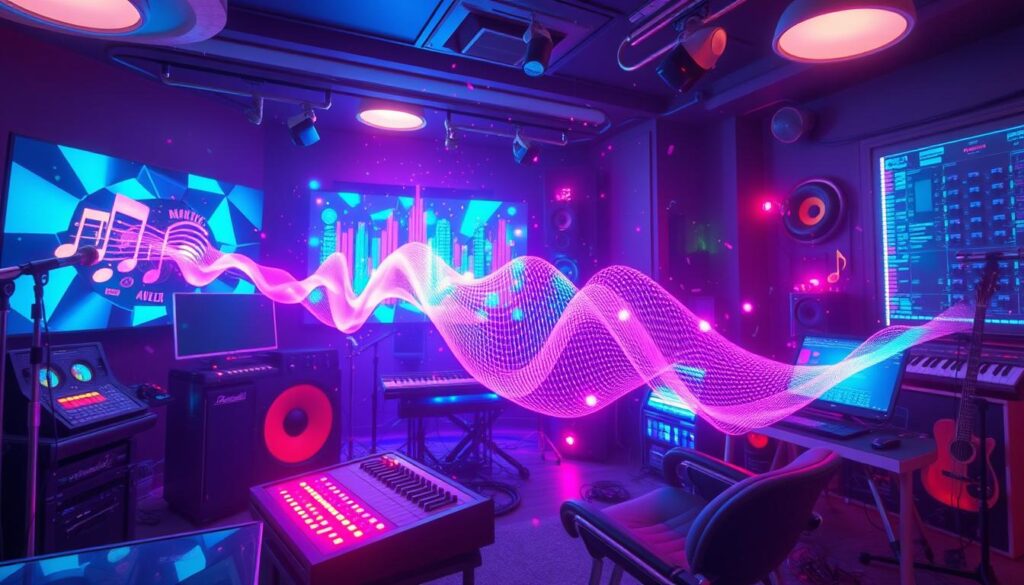
AI music brings many benefits, changing music creation in exciting ways. It gives creators more freedom and simplifies tasks that used to take hours. This makes making music faster and easier, without needing expensive equipment78.
AI in music also helps people work together better. It creates unique songs and helps people learn about music. Users can make complex music easily, controlling how detailed it is8.
Another great thing is that music making is now open to everyone. No matter your budget or skill level, you can make music. Tools like Soundful are affordable and keep getting better, offering new ways to explore sound78.
How to Generate an AI Song?
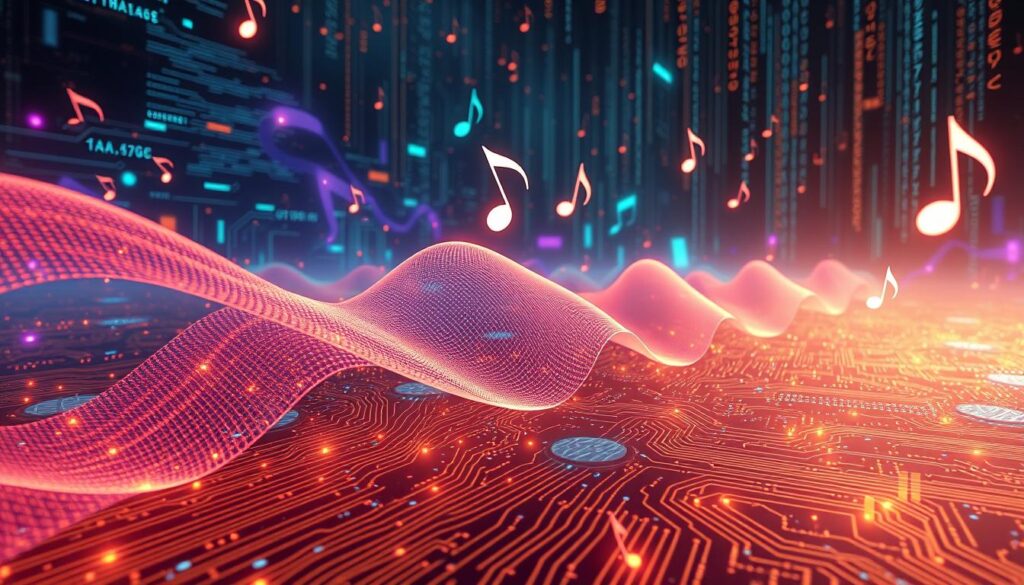
Creating an AI song is easy. First, pick music tools that match your style and needs. The right tool makes creating music fun and rewarding.
Step 1: Choose Your AI Music Tool
The first step is to choose music generation tools that are easy to use and powerful. Soundraw and Loudly are great examples. They use smart algorithms to create music that you’ll love9.
Step 2: Select Genre and Mood
After picking your tool, decide on the genre and mood of your song. You can choose from many styles like pop, rock, and jazz. This lets you make music that tells your story. Premium plans offer better sound quality and more genres, perfect for pros10.
Overview of Popular AI Music Tools
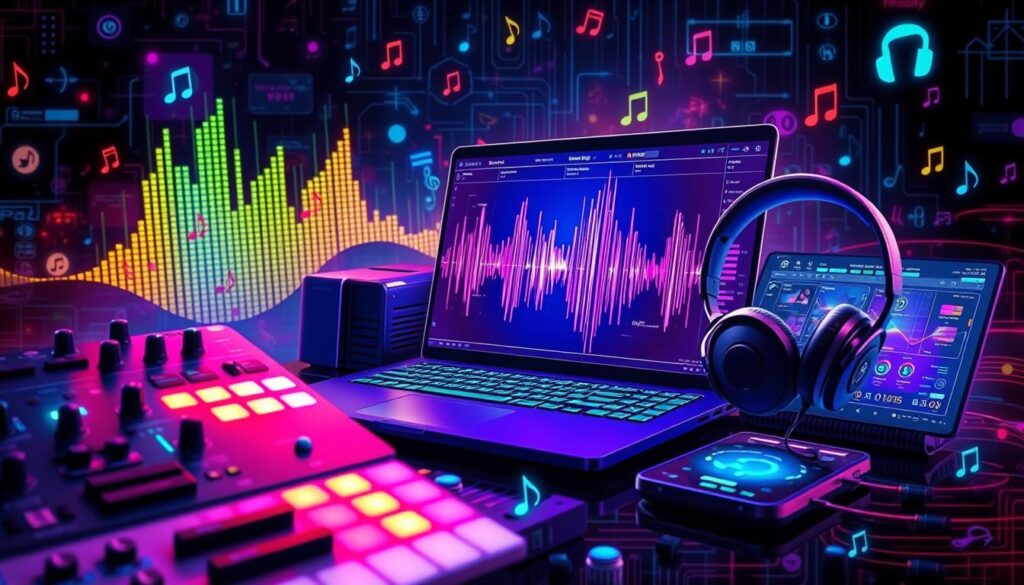
The world of music production is changing fast. Many AI music tools have come out, each with its own special features. Knowing about these tools can really help musicians be more creative and efficient when making music.
Soundraw
Soundraw is known for making music without limits. It lets users make tracks that fit their style perfectly. It’s great for those who want to create music that’s all their own, without using copyrighted stuff.
Reviews say Soundraw is awesome because it offers a free plan. This plan lets users make music without downloading it. Paid plans start at $16.99 a month11.
Loudly
Loudly is loved for its top-notch music and huge selection of genres. It’s perfect for both new and experienced musicians. Users can try out many different musical styles.
Reviews often talk about how easy Loudly is to use. It’s great for making royalty-free music. This helps artists make money from their music11.
How to Customize Your AI-Generated Tracks
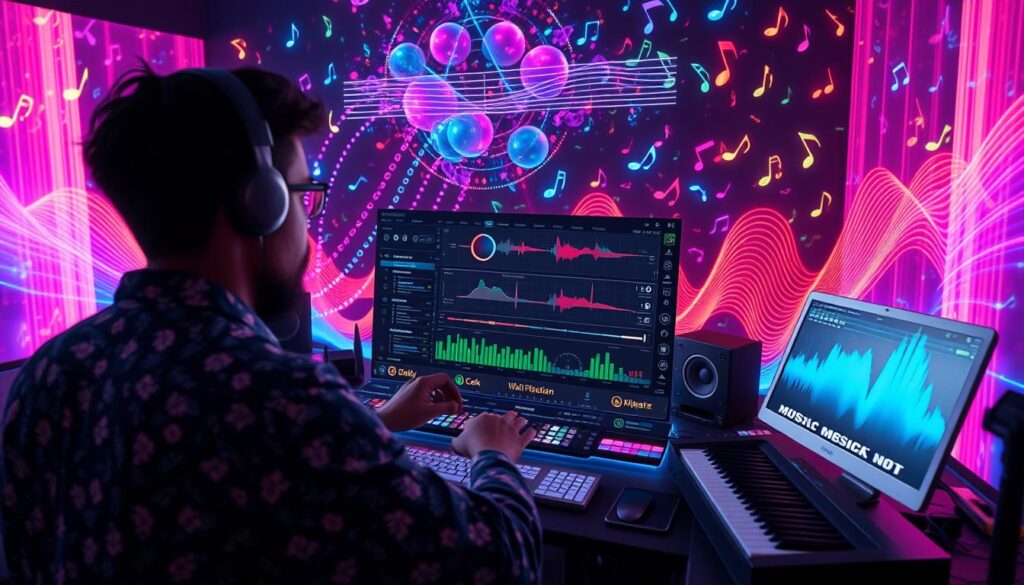
Customizing AI music is key for producers wanting to make tracks their own. They can use tools to change things like tempo and add their own sounds. This makes the music feel more like their own vision.
Tools like OpenAI’s MuseNet, Boomy, and AIVA let users customize a lot. They can choose the genre and mood they want, and the AI makes music that fits. This makes the music feel real and lets artists add their own touches.
Customizing AI-generated music not only refines the end result but also enriches the creative process, enabling a seamless blend of technology and artistry.
Using these tools, artists can make their tracks truly unique. This creative process helps them stand out in the music world1213.
Choosing the Right Length and Structure for Your Song
When making music, knowing the basics of song structure is key. It’s about arranging parts like verses, choruses, and bridges in a way that makes sense. Different music styles have their own rules, and understanding these can help you build a better song.
AI music tools let you adjust the music length of your songs. But picking the right length is important. Pop songs usually last between three to four minutes. This keeps listeners interested. Going too long or too short can make your song less appealing.
Guides like Musicfy teach you about song parts, like writing lyrics and making melodies. These are vital for a song that connects with people well14. Even though AI music might not be as polished as the classics, it can still be fun to dance to. This is if you focus on the right song structure and pay attention to your lyrics and melody15.
Exploring the Features of AI Music Applications
AI music apps are changing how we make music. They offer features that make creating music better. Users can edit and personalize songs with easy tools, making each track special.
For example, Soundraw lets musicians make endless songs with unique features. It has plans for all kinds of users16. This lets creatives try new things and improve their sound easily.
Editing and Personalizing Your Song
AI music apps have great editing options. You can change the tempo, instruments, and add effects easily. This makes your song feel real.
Customizing tracks is now easy. AI tools help adjust melodies or harmonize vocals. This lets musicians make great music while keeping control.
Downloading and Sharing Your Music Creations
After you finish a track, downloading and sharing it is simple. Most apps let you export in WAV, FLAC, and MP3 formats. This meets different needs.
Sharing on social media or streaming sites is also easy. This lets users share their music with others. Whether for fun or to promote, it’s easy to get your music out there17. The mix of editing tools and sharing options shows how important AI is in music.
Ethics and Copyright in AI-Generated Music
The rise of AI music has sparked big talks about AI music ethics and copyright issues in AI music. As AI music tools become more popular, it’s key to know the legal and ethical sides. For example, the US Copyright Office says only human-made works can get copyright protection18.
This means AI music alone might not be protected. Companies like Suno and Udio are facing lawsuits for using copyrighted music in their AI products19. This shows the mix of new ideas and legal problems in AI music.
Many platforms are working to handle music rights management better. Soundful, for instance, says it won’t use copyrighted data in its AI models. It also makes sure creators own the music made by its tools20. This helps keep the music world fair and respectful.
But, figuring out who owns AI music can be tricky. It’s hard to say who should get credit for AI-made songs19. This problem makes it hard to solve the copyright issues in AI music.
Real-World Applications of AI Music
AI music is changing the game in film, ads, and games. Aiva Technologies lets creators use a soundtrack AI engine for free or with paid plans. This boosts creativity in making media21. Beatoven.ai also lets users make music with text prompts, starting at just $6 a month21.
AI music is also helping in schools. Teachers use it to make learning fun in science, history, and more. Tools like MusicFX and Loudly help teachers create sounds that match their lessons22. Students can even make music that shows how they feel after a lesson, helping them understand better22.
AI music tools are getting better all the time. Platforms like Soundful and Udio offer flexible plans for making unique soundtracks. They make music creation easy and change how sound is used in media, making a big impact2122.
FAQ
What is AI music creation?
How do AI music generators work?
What are the advantages of using AI for music generation?
How can I generate an AI song?
What are some popular AI music tools available?
How can I customize AI-generated tracks?
What should I consider regarding song length and structure?
What features do AI music applications offer?
What are the ethical considerations in AI-generated music?
Where is AI music being applied in the real world?
Source Links
- AI Music Generator | Loudly
- 10 AI Music Generators for Creators in 2024 | DigitalOcean
- How-To: Creating Music with AI Music Generators | Soundful
- The Rise of AI-Generated Music: What It Means for Artists » Flourish$Prosper Music Group
- AI Music for Beginners: A Step-by-Step Guide
- What AI in music can — and can’t — do
- Benefits of using AI Music in Production | Soundful
- The Benefits Of Composing With AI Music Generator – Soundsphere magazine
- AI Song Generator – Create Songs in Seconds
- I tested 4 AI text to song generators with the same prompt
- Top 9 AI Music Generators to Try in 2024 – The Future of Music is Here – Kripesh Adwani
- AI Music Generator SOUNDRAW
- How to Make AI Music? | Speechify
- How To Make Your Own Song (With AI!) | Musicfy AI Blog
- How to Help AI Write a Decent Song
- Top 11 AI Music Generators of 2024
- Exploring how AI makes music – everything you need to know – PUSH.fm
- Ethical AI in Music: Navigating Copyright Concerns – SOUNDRAW Blog
- AI can make up songs now, but who owns the copyright? The answer is complicated
- Ethical Considerations on AI Music | Soundful
- AI-Generated Music: 11 AI Music Generators to Know | Built In
- 7 Ways to Use AI Music in Your Classroom – Class Tech Tips







